Environmental country reviews
About environmental performance reviews
A brief history
By the early 1990s, OECD governments had enacted a wide variety of environmental laws and signed up to a multitude of environmental treaties and declarations. It became clear that mechanisms were needed to ensure that governments were keeping their environmental promises.
To meet this challenge, Environment Ministers called on the OECD to review environmental performance in member countries. This mandate was confirmed by the OECD Council meeting at Ministerial level in June 1991, and supported by the London G-7 economic summit in July 1991.
The Environmental Performance Review (EPR) programme was launched in 1992. Reviews are conducted within a peer review framework, which is one of the OECD’s core working methods. To date, the OECD has conducted over 80 country reviews, including reviews of key partner countries like Brazil, the People's Republic of China and South Africa. The reviews occur in cycles, and OECD countries are now being reviewed for the third time.
What's in the reviews?
Since 1992, the OECD has conducted over 100 Environmental Performance Reviews of its member and partner countries.
- The assessment and recommendations summarise the main findings of the review and present policy recommendations to help the country improve its environmental performance.
- Key environmental trends describe the country’s progress in using energy and natural resources efficiently, reducing the carbon intensity of its economy, managing its natural assets and improving environmental quality of life.
- Environmental governance and management reviews the country’s environmental governance system and legislative framework, and how the country ensures compliance with environmental regulations.
- Towards green growth presents the country’s efforts to mainstream environment into its economic policy and to promote the greening of the economy, for example through the use of taxes and other pricing instruments.
- Each country also chooses two topics for in-depth analysis. Countries have selected issues such as climate change, biodiversity, sustainable management of waste and materials, and environmental technologies.
Key steps of the review
review preparation and information collection
- Selection of the in-depth chapters and agreement on the timetable.
- Questionnaire response in co-operation with relevant ministries and agencies.
- Data and documentation compilation.
- Preparation of the review mission, involving a team of analysts and specialists, including experts from two reviewing countries.
Review mission
The review team meets with environment and other ministry officials, representatives of industry, trade unions, NGOs, independent experts and local governments. Building on the information collected, discussions focus on the evaluation of environmental performance and how it could be improved.
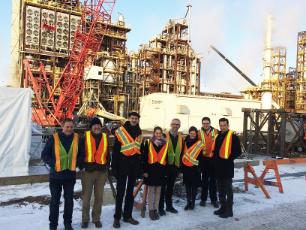
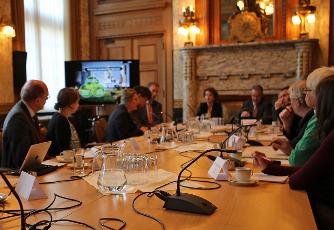
Photos: Jacklyn Peterson, Mission to Edmonton, Canada 2017;
Nils-Axel Braathen, Meeting in Rotterdam, Netherlands 2015.
policy meeting
- High-level discussion of the draft assessment and recommendations of the EPR, between the OECD Secretariat and the reviewed country government.
draft report
- The draft report and its assessment and recommendations are made available to the government of the reviewed country and representatives of the OECD Working Party on Environmental Performance.
Peer review
The draft report is presented and discussed at meetings of the OECD Working Party on Environmental Performance (WPEP), usually held at the OECD headquarters in Paris.
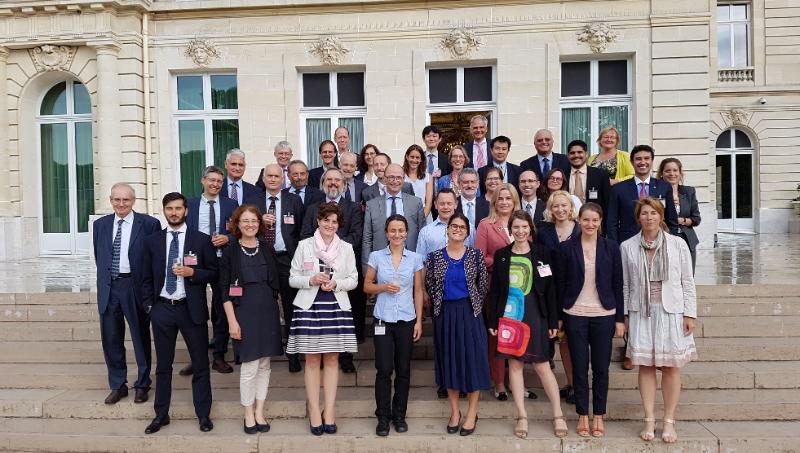
The Working Party on Environmental Performance convenes policy-makers from all the OECD member and partner countries. The delegates are usually senior representatives from Environment Ministries, as well as representatives from a country’s permanent delegation to the OECD. The WPEP reports to the Environment Policy Committee.
On 14 February 2018, the WPEP welcomed a delegation from Czech Republic for their third Environmental Performance Review.
A full day of the WPEP meeting is allocated to the peer examination of a given country. The reviewed country delegation is headed by a high level government official, usually the Minister or the Secretary of State, and consists of several members representing the Environment Ministry and other relevant government agencies. The reviewing countries take the lead in opening the discussion. All countries participate in the debate and can ask questions. At the end of the meeting the WPEP approves the Assessment and Recommendations. As a result, the Assessment and Recommendations reflect the collective views of OECD members.
In addition to providing specific recommendations to the reviewed country, the exchange of views helps other countries better understand the issues at stake in the reviewed country and to identify good practices that could be applied more widely.
the launch
The launch of each EPR is a public event, where government representatives, academics, businesses, NGOs and the media discuss current policies and the best ways to improve them, based on facts provided in the review.
The key messages of the reports are showcased in Highlights brochures, on the website and on social networks.
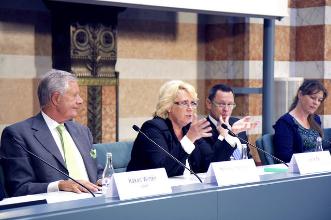
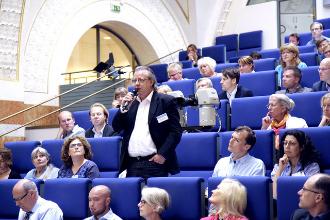
Photos: Launch of the Assessment and recommendations of the EPR of Sweden 2014,
Swedish ministry of Environment/Flickr.
>> See the Publications Page of recent EPRs
Related Documents